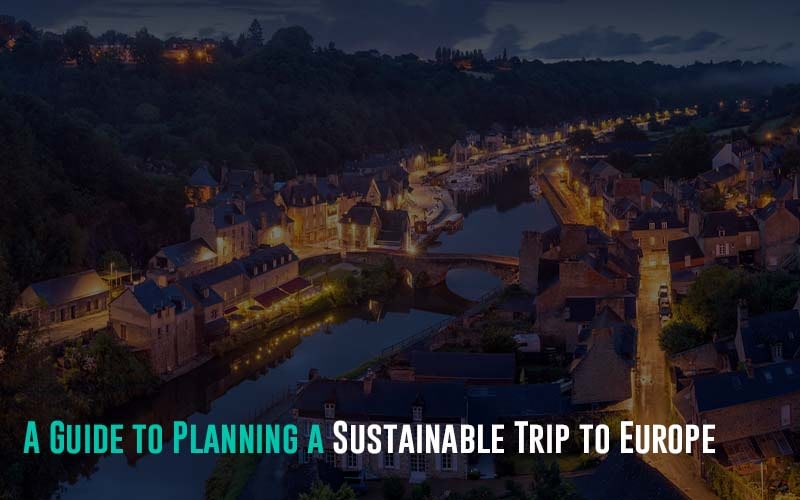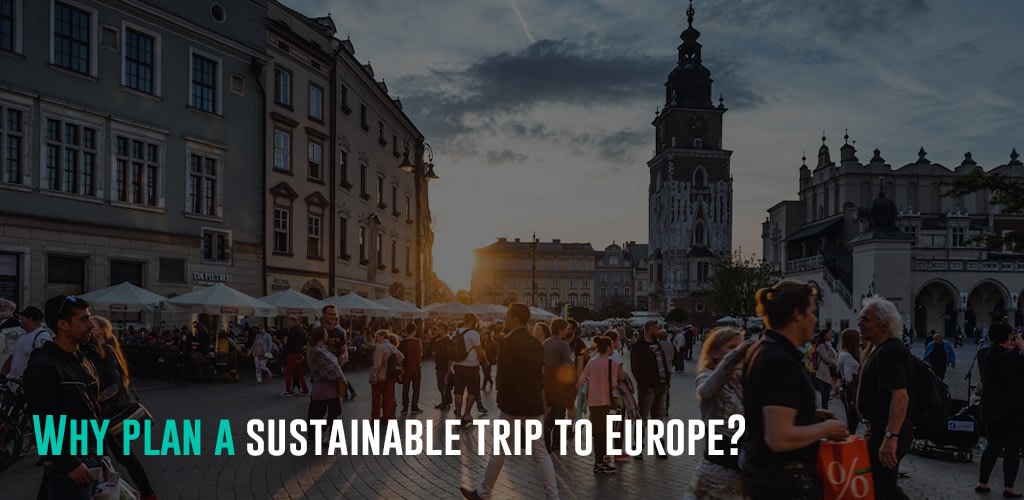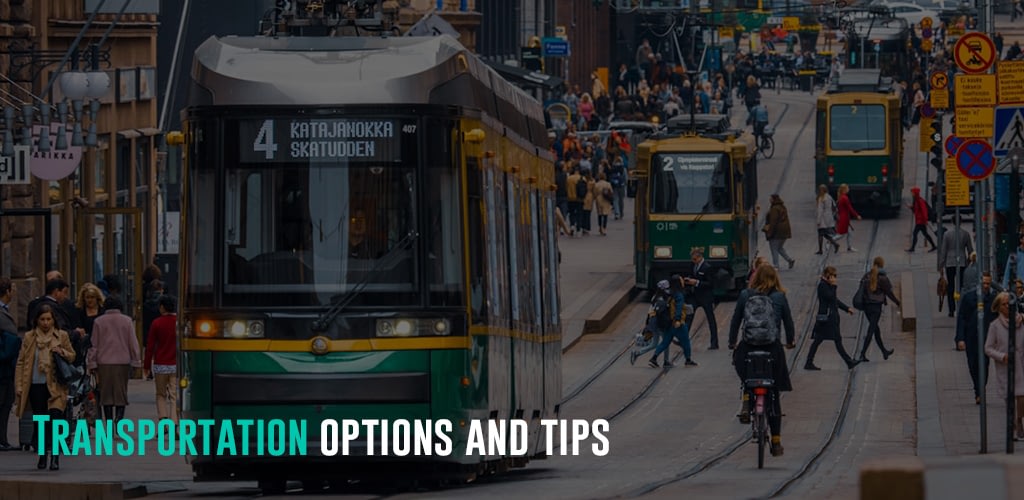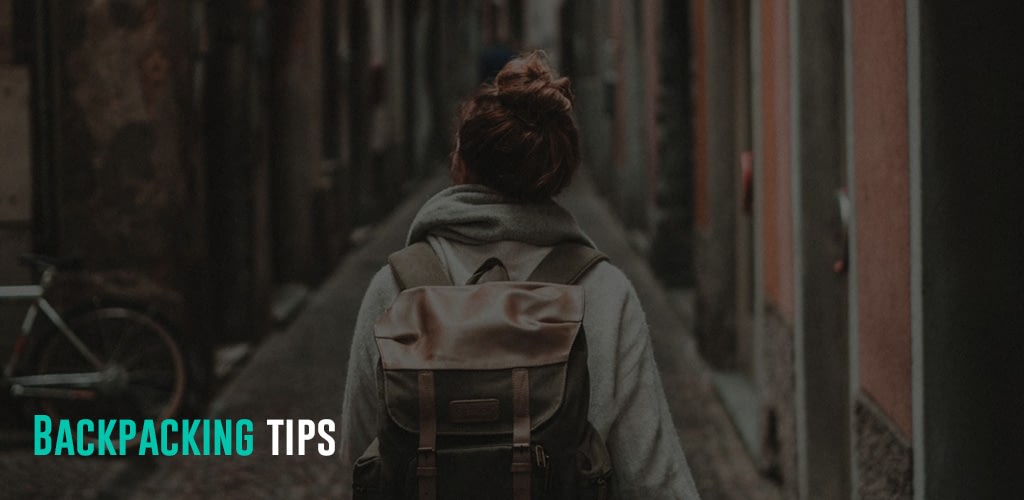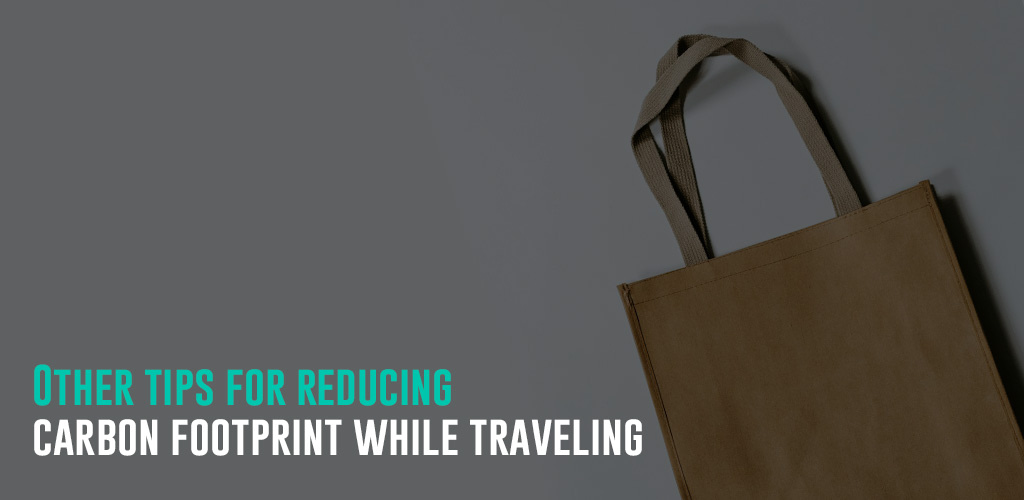Traveling today is not just about going to new destinations. Many travelers started raising questions as to the impact of tourism on the surrounding environment and local communities. They believe in traveling in a sustainable way in which they can explore a new place instead of abusing plants, animals, and other natural things living over there. In this guide, we are going to discuss the concept of sustainable travel and thereafter give you practical tips that will help you plan a responsible trip to Europe that is eco-friendly.
Featured Image Source
What is sustainable travel?
Sustainable travel, also known as eco-friendly or responsible travel, denotes traveling without hurting the environment, culture, or economy of a destination. That means conscious choices made to help local communities preserve natural resources while not disturbing cultural heritage. All this is possible by being mindful of sustainable practices that enable all who travel to have a fulfilling experience and immerse themselves in the place, leaving nothing but a good footprint when they go back.
Why plan a sustainable trip to Europe?
Europe, the country of varied landscapes, vivid history, and colorful cultures, provides infinite sustainable destinations to explore. A planned Europe trip considering sustainability as a core will provide numerous possibilities to connect with nature in its raw form, experience true local traditions, and become a part of saving it from becoming extinct.
Best sustainable destinations in Europe
- Lahti Region, Finland
Nestled amidst stunning lakes and lush forests, the Lahti Region in Finland is a haven for nature lovers. This region has been recognized for its sustainable practices, including renewable energy initiatives and environmentally friendly transportation. Travelers can explore the pristine wilderness, hike through national parks, or indulge in winter sports while enjoying the scenic beauty of this eco-conscious destination.
- Monte Isola, Brescia – Italy
Located in the middle of Lake Iseo, Monte Isola is a car-free island in Italy known for its commitment to sustainability. The island promotes eco-friendly transportation and encourages visitors to explore its picturesque landscapes on foot or by bicycle. With charming villages, olive groves, and breathtaking views, Monte Isola offers a unique and sustainable experience for travelers.
- Cavtat Konavle Region, Croatia
Nestled on the Adriatic coast, the Cavtat Konavle Region in Croatia offers a blend of natural beauty, cultural heritage, and sustainable practices. Travelers will have a chance to explore the picturesque coastline, bask in the sun on clean beaches, and taste traditional dishes prepared with the use of fresh local products. Eco-friendly tourism is promoted in the region as well, along with the development of small businesses, so that this wonderful land can be preserved for future generations.
- Mostviertel, Austria
Mostviertel in Austria is a hidden gem for sustainability enthusiasts. Surrounded by rolling hills, vineyards, and orchards, this region is committed to organic farming and sustainable agriculture. Travelers can enjoy biking or hiking through the picturesque landscapes, visit charming villages, and savor delicious organic produce. Mostviertel offers a tranquil and eco-friendly escape for those seeking a sustainable experience in Austria.
- Durbuy, Belgium
Durbuy, often referred to as the “smallest city in the world,” is a picturesque town in Belgium that places great emphasis on sustainable tourism. By adopting environmentally friendly practices and showcasing local craftsmanship and gastronomy, Durbuy offers a truly immersive experience for conscientious travelers. Exploring this charming town on foot, visiting local markets, and engaging with the community allows visitors to support sustainability initiatives while enjoying the beauty of the Ardennes region.
- Sheep’s Head, Ireland
Sheep’s Head, located on Ireland’s Wild Atlantic Way, is a rugged peninsula known for its unspoiled beauty and dedication to sustainable tourism. Travelers can embark on scenic hikes along cliffside trails, spot diverse wildlife, and experience the warmth of Irish hospitality in eco-friendly accommodations. With its commitment to preserving the natural environment and promoting responsible tourism, Sheep’s Head provides an authentic and sustainable Irish experience.
- Soomaa National Park, Estonia
Soomaa National Park in Estonia is a hidden gem for nature enthusiasts seeking sustainable adventures. This unique wetland area offers a rich biodiversity and an opportunity to explore pristine forests, canoe through floodplains, and observe rare wildlife. With its dedication to promoting environmentally friendly practices and engaging with local communities, Soomaa National Park allows travelers to connect with nature while supporting sustainable tourism in Estonia.
- Ebro Delta, Spain
The Ebro Delta in Spain is a paradise for birdwatchers, nature lovers, and sustainable travelers alike. It is a region known for its rich biodiversity, which includes the species of birds and the unique ecosystems of the area. It has committed to responsible tourism, and every effort is made for conservation purposes. Involvement in eco-tours to simply enjoy the natural beauty of the place and involvement in enjoying seafood specialties from the locations of catch are the options available for those who visit this region. A visit to the Ebro Delta will provide an experience not to be forgotten, as well as a way of helping in the attempts to protect this delicate ecosystem.
- Nin, Croatia
Nin, a small town located on a picturesque island in Croatia, is a perfect choice for those seeking sustainable and authentic experiences. This historic town has preserved its cultural heritage and traditional way of life, offering visitors a glimpse into Croatia’s rich history. Travelers can explore ancient architecture, relax on pristine sandy beaches, and support local artisans. By choosing to visit Nin, you are supporting the sustainability efforts of this charming Croatian destination.
- Bohinj, Slovenia
Bohinj, nestled in the Julian Alps of Slovenia, is a paradise for outdoor enthusiasts and sustainable travelers. This region, among high mountains, pure milky lakes, and productive forests, is a paradise for active relaxation in the form of walking, biking, and skiing. While looking at the picturesque landscapes, one can participate in eco-friendly projects of local dwellers, stay in ecologically unclear places, and taste food from organic farm-to-table. Bohinj offers a perfect blend of adventure and sustainability for those seeking an unforgettable experience in Slovenia.
Tips to choose sustainable accommodations
First of all, being the most important first step toward planning a trip to Europe, keep in mind the environment. Some of the things to consider while choosing will be:
- Look for eco-certifications: Check if the accommodation has certifications like Green Key or LEED that ensure their commitment to sustainability.
- Consider locally owned accommodations: Supporting local businesses fosters the local economy and ensures a more authentic experience.
- Research their sustainability initiatives: Look for accommodations that have implemented energy-saving measures, waste reduction practices, or support local community projects.
- Opt for eco-friendly amenities: Choose accommodations that provide eco-friendly toiletries, promote recycling, or have energy-efficient appliances.
By selecting sustainable accommodations, you not only contribute to the conservation of natural resources but also support the livelihoods of local communities.
Transportation options and tips
For the purpose of green travel, transportation assumes an important role in carbon reduction. Here are ways to eco-travel and tips to support your European travel:
- Public transport: In most cases, individual trains, buses, or trams will be more efficient compared to individually moving around in a car.
- Cycling: Explore cities and countryside on two wheels, taking advantage of bike-sharing programs or renting bicycles.
- Carpooling: In the event that a rental of cars is unavoidable, there could even be potential carpooling between those traveling together to limit the number of rented cars.
- Choose flights direct: Whenever possible, choose the flights direct since take-offs as well as landings depend on more fuel usage compared to cruising, hence producing more carbon emissions.
Remember to offset your carbon footprint by supporting climate initiatives or donating to projects that promote renewable energy.
Backpacking tips
For those planning a sustainable backpacking trip in Europe, here are some tips to help you minimize your environmental impact:
- Pack light: Travel with fewer items to decrease your carbon footprint, conserve energy, and make your trip more manageable.
- Carry a reusable water bottle and food container: Reduce single-use plastic waste by using refillable water bottles and reusable food containers.
- Choose eco-friendly toiletries: Opt for biodegradable shampoo bars, solid soaps, and natural skincare products to minimize your use of plastic containers.
By adopting sustainable practices while backpacking, you can explore Europe’s hidden gems while leaving a positive impact on the environment.
Other tips for reducing carbon footprint while traveling
Reducing your carbon footprint goes beyond accommodations and transportation choices. Here are some additional tips to make your trip to Europe more sustainable:
- Pack a reusable shopping bag: Avoid single-use plastic bags by carrying a reusable shopping bag for your travel essentials.
- Use eco-friendly travel accessories: Choose reusable travel utensils, metal straws, and eco-friendly sunscreen to reduce waste.
- Opt for digital travel documents: Use electronic tickets, boarding passes, and travel guides to minimize paper waste.
- Conserve energy: Turn off lights, heating, and air conditioning when leaving your accommodations and be mindful of your energy consumption.
Every small step contributes to a greener and more sustainable travel experience.
Tips for exploring sustainable food options in Europe
The taste of local flavor is incomplete without tasting delicious local food that is included in an essential travel package. Here are some tips to find sustainable food alternatives on a trip to Europe:
- Choose farm-to-table restaurants: Look for eateries that source their ingredients locally, supporting local farmers and reducing food miles.
- Visit farmers’ markets: Experience the vibrant food culture of Europe by exploring farmers’ markets, where you can find fresh and seasonal produce.
- Seek sustainable seafood: If you enjoy seafood, opt for certified sustainable options to support responsible fishing practices.
- Embrace plant-based options: Try traditional vegetarian or vegan dishes that showcase the region’s cultural cuisine while reducing the environmental impact of animal agriculture.
By embracing sustainable food options, you can savor the flavors of Europe while supporting local farmers and reducing the carbon footprint of your meals.
Conclusion
Planning a sustainable trip to Europe allows you to embark on a memorable adventure while minimizing your impact on the environment and supporting local communities. By choosing sustainable destinations, accommodations, transportation options, and food choices, you can make a positive contribution to the places you visit. Let this guide serve as your roadmap to ensuring a fulfilling, responsible, and eco-friendly journey through the diverse landscapes and rich cultures of Europe. Happy travels!
Start planning your trip now with Travel-Wise’s free trip-planning tools to have you on your way to your destination faster than ever!

